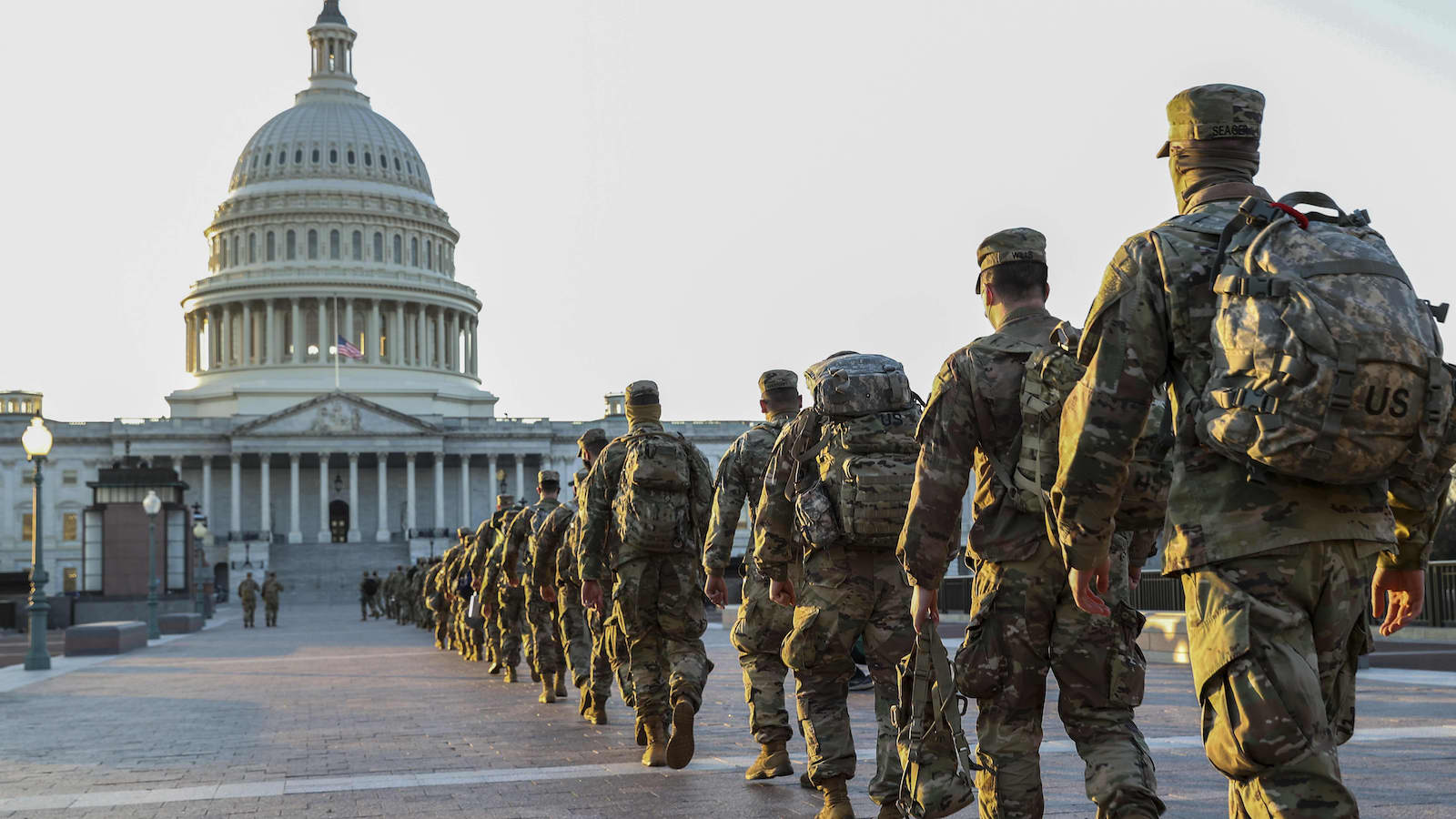
Defend the Guard—A Grassroots Movement With an Important Goal
The potential of this movement to help reign in our unconstitutional foreign policy cannot be overstated.
Over the past couple of months, the topic of war has dominated the news cycle as the Russian government continues its appalling invasion of Ukraine. This war has highlighted the fact that a country sending its military into a sovereign nation to use violence and force to fulfill the political agendas of that country’s elites is a disgusting abuse of power that costs the lives of soldiers and civilians on both sides of the conflict, not to mention the destruction to infrastructure and the economic toll that war also entails. Many people in the U.S. were quick to condemn this ongoing invasion, and rightly so, but at the same time we seem to have failed to recognize an important lesson that we should take away from this awful situation.
Many U.S. citizens appear to view the actions of the Russian government as a window into a strange scenario that could only happen under an autocratic regime, but in reality, it’s more like a mirror showing us a dark reflection of our own foreign policy. Far too many of our government officials, both elected and unelected, have abused their authority over the years by using our military to invade foreign countries, destabilize foreign governments, and occupy foreign lands for decades; they have also misled us into each and every one of those conflicts. The brave men and women who sign up to serve this country and defend the Constitution should not be manipulated into participating in these military interventions that don’t pertain to our national security and only further the political agendas of warmongering politicians.
One demographic that understands this unfortunate reality better than most is those who have served in these wars and have seen the effects first-hand. Many people, including veterans and active-duty service members, have tried to draw attention to this issue and convince our elected officials to end our military interventionism abroad, but our politicians continue to engage in their warmongering habits and many U.S. citizens seem more than content to allow such behavior.
A group that has been fighting to bring an end to these unconstitutional military interventions is Bring Our Troops Home, a nonpartisan grassroots organization based out of Idaho that is “dedicated to ending American involvement in the Middle East and bringing our troops home,” according to their website. Their founder and chairman, Sgt. Dan McKnight, is a 13-year veteran who served in the Marine Corps and the U.S. Army, as well as the Idaho National Guard.
Bring Our Troops Home has taken on a project called Defend the Guard, a movement with the intention of passing state-level legislation prohibiting the deployment of National Guard troops for combat overseas without an official declaration of war from the U.S. Congress, which is a requirement embedded into the Constitution in Article I, Section 8. The last time Congress issued such a declaration was 80 years ago, in 1942. Every war since then has been waged without going through the proper constitutional process, a trend that has led to an era of Forever Wars.
“The modern Defend the Guard movement was started by Delegate Pat McGeehan of West Virginia,” McKnight told me over email. “Pat is a graduate of the U.S. Air Force Academy and served as an intelligence officer throughout the Middle East. In 2015 he introduced the bill in his home state, and continued to do so year after year. It takes principle to keep up that sort of thankless work, being the lone legislator sponsoring a bill. But that perseverance paid off.” He goes on:
It may come as a surprise, but National Guard troops are deployed for combat far more often than most people realize (myself included). “Even though they don’t get enough credit,” McKnight told me, “the National Guard has been the backbone of the U.S. military during the Global War on Terror.” Many people probably assume that the National Guard is only deployed within our borders to provide assistance in situations like natural disasters and mass civil unrest, but that’s not always the case. According to McKnight:
When you consider how often our government unconstitutionally deploys our National Guard overseas, it becomes clear why passing Defend the Guard legislation is so important. I would personally love to see every unnecessary U.S. military intervention come to an end, but that won’t happen overnight. If enough people put in the effort, however, I do believe it is possible, and Defend the Guard is a great step in the right direction.
McKnight told me that there were 31 states with legislators willing to sponsor the Defend the Guard bill in 2021 and that they’re on track to have it introduced in 40 states by the end of this year. If one state can successfully pass this bill it will set an example to others, and as more states follow suit it will significantly increase the likelihood of Defend the Guard legislation passing across the country. The potential of this movement to help reign in our unconstitutional foreign policy cannot be overstated.
Here, in my home state of Utah, local resident David Iglesias heads Defend the Guard – Utah, working locally to try and get this important bill introduced in the state legislature. He has also spread the word about the movement through his Unrestrained Thoughts podcast. For anyone reading this who wants to learn more about the Defend the Guard movement or about some of the history of the National Guard and its original purpose, I would recommend listening to Episode 8 where David interviews Sgt. Dan McKnight and Episode 11 with Peter Gilbert of the Utah Air National Guard. (Disclosure: David and I went to high school together and I can attest that he is a good guy with an excellent podcast. He also suggested to me that I write this article.)
I’ve long been an advocate for ending these wars, and I firmly oppose any attempts by our politicians to drag us into newer conflicts. However, I personally am not a veteran of any kind, so I was curious to get the opinion of someone who has actually served in the military.
I talked to my friend Dave Shepherd who told me he “was 5 years active duty USMC Rifleman. 3rd battalion 3rd Marines,” and that he also “worked as a designated Marksman with FAST (Fleet Anti Terrorism Security Team) which is a quick reaction force for AFRICOM and Centcom.” Considering his five years of military experience compared to my strictly civilian perspective, I asked him about his opinion on Defend the Guard to which he replied:
I personally believe that Defend the Guard has great potential to strike a blow against proponents of these Forever Wars and to prevent our politicians from sending even more National Guard troops into harm’s way overseas. The passage of this legislation across the country could possibly reach even further than that, however, as it would be a giant step toward eventually ceasing all unnecessary U.S. military engagements around the world.
For those who want to help support Defend the Guard, McKnight proposes several ways to do so:
I’ll end with the words of Sgt. Dan McKnight, as this last quote of his fully encompasses the purpose of this article: “If you believe in the Constitution and the American experiment in self-government, if you believe these endless, illegal wars in the Middle East have been bad for our country, and if you agree with a majority of veterans that we need to bring our troops home, then you ought to support Defend the Guard with everything you’ve got.”
Free the People publishes opinion-based articles from contributing writers. The opinions and ideas expressed do not always reflect the opinions and ideas that Free the People endorses. We believe in free speech, and in providing a platform for open dialogue. Feel free to leave a comment.




Stephana Landwehr
I am the co author, with Abbot Brayton, Pollitics of War and Peace: A; Survey of Thought. It contains the writings on the issue from 60 great thinkers. It is available on line from Amazon, Barnes and Noble, and Bookbaby. I could send you a copy of the original printing in paper back copy, if you would like and let me know. I think your organization and members would appreciate these thoughts and find support of the Defend the Guard in it. It is easily read.